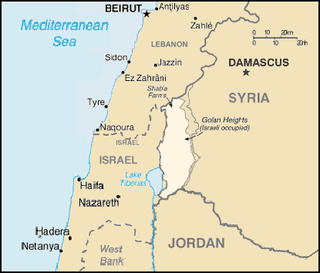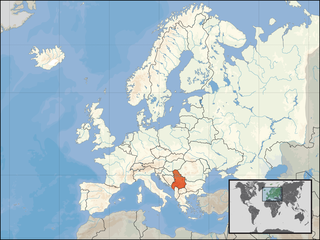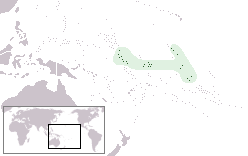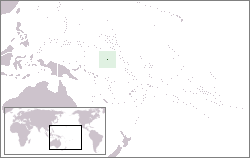
A United Nations Security Council resolution (UNSCR) is a United Nations resolution adopted by the Security Council (UNSC), the United Nations (UN) 15-member body charged with "primary responsibility for the maintenance of international peace and security".
A United Nations General Assembly resolution is a decision or declaration voted on by all member states of the United Nations in the General Assembly.

United Nations Security Council resolution 497, adopted unanimously on 17 December 1981, declared that the Israeli Golan Heights Law, which effectively annexed the Golan Heights, is "null and void and without international legal effect" and further calls on Israel to rescind its action.

A United Nations resolution is a formal text adopted by a United Nations (UN) body. Although any UN body can issue resolutions, in practice most resolutions are issued by the Security Council or the General Assembly, in the form of United Nations Security Council resolutions and United Nations General Assembly resolutions, respectively.

United Nations Security Council Resolution 365, adopted on 13 December 1974, after receiving General Assembly resolution 3212 and noting with satisfaction in unanimous adoption the Council endorsed the General Assembly resolution and urges the parties concerned to implement it as soon as possible, requesting the Secretary-General to report on the progress of the implementation of this resolution.

United Nations Security Council resolution 462, adopted on 9 January 1980, after considering an item on the agenda of the council and given the lack of unanimity amongst its permanent members, the council decided to call an emergency meeting of the United Nations General Assembly to discuss the Soviet invasion of Afghanistan.

United Nations Security Council resolution 500, adopted on 28 January 1982, after considering an item on the agenda of the council and given the lack of unanimity amongst its permanent members, the council decided to call an emergency meeting of the United Nations General Assembly to discuss the Israeli occupation of the Golan Heights.

United Nations Security Council resolution 704, adopted without a vote on 9 August 1991, after examining the application of the Marshall Islands for membership in the United Nations, the Council recommended to the General Assembly that the Marshall Islands be admitted.

United Nations Security Council resolution 777, adopted unanimously on 19 September 1992, after reaffirming Resolution 713 (1992) and all subsequent resolutions on the topic, the Council considered that, as the state known as the Socialist Federal Republic of Yugoslavia (SFRY) had ceased to exist, it noted that under Resolution 757 (1992), the claim by the Federal Republic of Yugoslavia to continue automatic membership in the United Nations was not widely accepted and so determined that membership of the SFRY in the United Nations could not continue. Therefore, the Council recommended to the General Assembly that the Federal Republic of Yugoslavia cease participation in the General Assembly and apply for membership in the United Nations.

United Nations Security Council resolution 821, adopted on 28 April 1993, after reaffirming Resolution 713 (1991) and all subsequent resolutions, the council also recalled resolutions 757 (1992), 777 (1992) and General Assembly Resolution 47/1 (1992) which stated that the state formerly known as the Socialist Federal Republic of Yugoslavia had ceased to exist and that it should apply for membership in the United Nations and until then should not participate in the General Assembly.

United Nations Security Council Resolution 1691, regarding the accession of Montenegro to the United Nations, was adopted without a vote on 22 June 2006. In the resolution, after examining the country's application for membership, the Council recommended to the General Assembly that it be admitted.

United Nations Security Council resolution 1248, adopted without a vote on 25 June 1999, after examining the application of the Republic of Kiribati for membership in the United Nations, the Council recommended to the General Assembly that Kiribati be admitted, bringing total membership of the United Nations to 186.

United Nations Security Council resolution 1249, adopted on 25 June 1999, after examining the application of the Republic of Nauru for membership in the United Nations, the Council recommended to the General Assembly that Nauru be admitted, bringing total membership of the United Nations to 187.

United Nations Security Council resolution 1358, adopted by acclamation at a closed meeting on 27 June 2001, having considered the question of the recommendation for the appointment of the Secretary-General of the United Nations, the Council recommended to the General Assembly that Mr. Kofi Annan be appointed for a second term of office from 1 January 2002, to 31 December 2006.

United Nations Security Council Resolution 1999 was adopted without a vote on 13 July 2011 after examining the application of the Republic of South Sudan for membership into the United Nations. The Council recommended to the General Assembly that South Sudan be admitted.

The eleventh emergency special session of the United Nations General Assembly opened on 28 February 2022 at the United Nations headquarters. It addresses the Russian invasion of Ukraine. Maldivian politician Abdulla Shahid served as President of the body during this time.

United Nations Security Council Resolution 2623 called for the eleventh emergency special session of the United Nations General Assembly on the subject of the 2022 Russian invasion of Ukraine. Albania and the United States introduced the resolution before the United Nations Security Council, which adopted it on 27 February 2022. Russia voted against while China, India and the United Arab Emirates abstained. As this was a procedural resolution, no permanent member could exercise their veto power.

United Nations General Assembly Resolution ES‑11/1 is a resolution of the eleventh emergency special session of the United Nations General Assembly, adopted on 2 March 2022. It deplored Russia's invasion of Ukraine and demanded a full withdrawal of Russian forces and a reversal of its decision to recognise the self-declared People's Republics of Donetsk and Luhansk.

United Nations General Assembly Resolution ES‑11/2 is the second resolution of the eleventh emergency special session of the United Nations General Assembly, adopted on 24 March 2022, following Resolution ES-11/1 which was adopted on 2 March 2022. Resolution ES‑11/2 reaffirmed the UN's former commitments and obligations under its Charter, and reiterated its demand that Russia withdraw from Ukraine's recognized sovereign territory; it also deplored, expressed grave concern over and condemned attacks on civilian populations and infrastructure. Fourteen principles were agreed.

United Nations General Assembly Resolution ES‑11/4 is the fourth resolution of the eleventh emergency special session of the United Nations General Assembly, adopted on 12 October 2022, following Resolution ES-11/3 which was adopted on 7 April 2022.

















